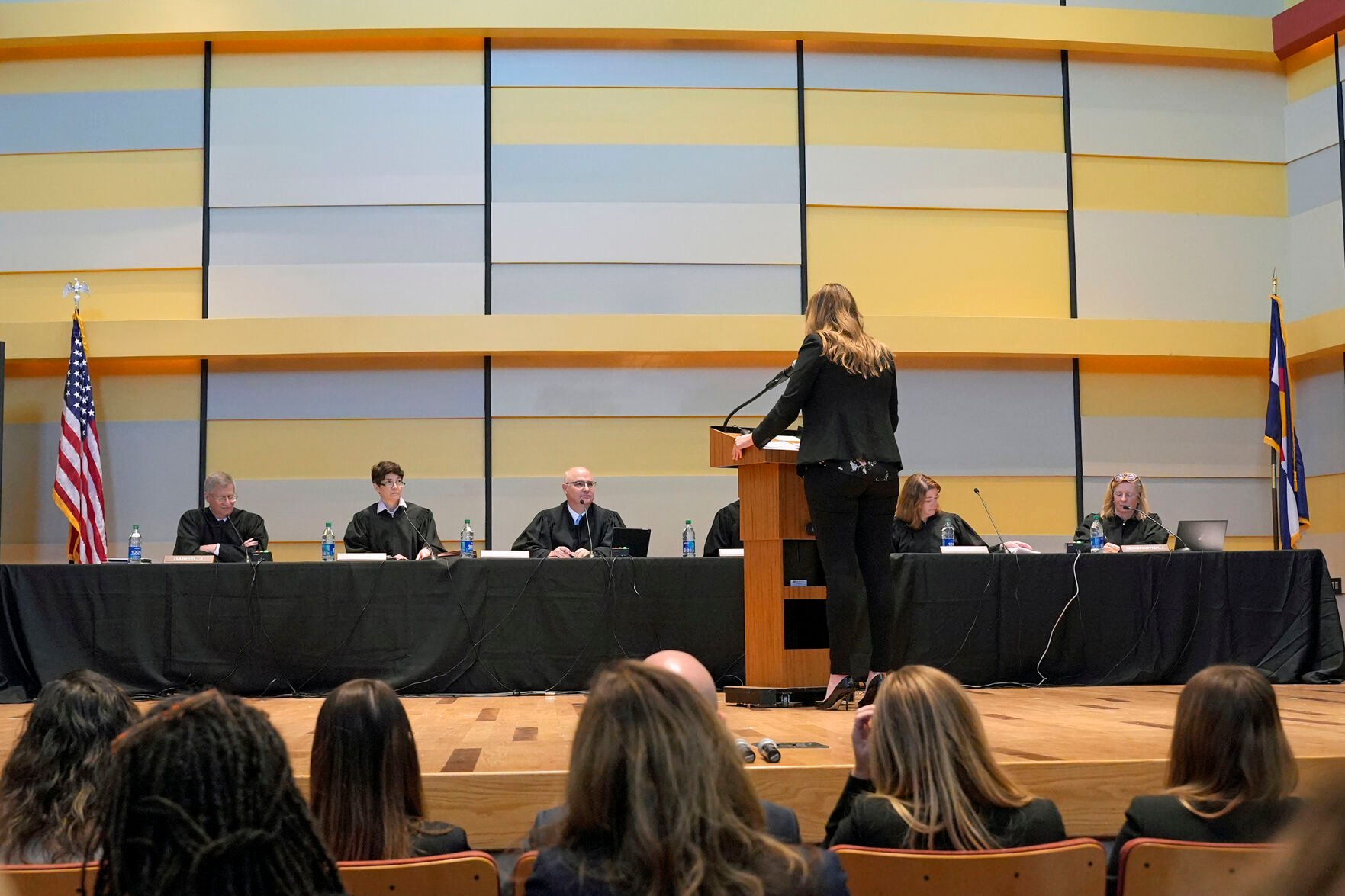Colorado Supreme Court reviews 3 cases, including prosecutor’s office plagued by misconduct

The Colorado Supreme Court has signaled it may intervene in three ongoing criminal cases, including one where the district attorney’s office chronically fails to turn over evidence to defendants – a practice that violates procedural rules and has angered trial judges in central Colorado.
In the past few weeks, the Supreme Court has ordered parties to provide more information in multiple proceedings appealed directly from the trial courts. Mid-case appeals to the Supreme Court are permitted when there is an imminent harm that the normal appeals process cannot rectify.
The state’s highest court will examine whether a Fremont County judge correctly reduced the severity of a murder charge in response to prosecutors’ repeated disregard of evidentiary rules, whether an Arapahoe County judge properly denied a man’s request to withdraw his guilty plea, and if jurors in Boulder County should be allowed to hear certain details favorable to the defendant in a sex assault case.
‘You have to do your job’
The 11th Judicial District Attorney’s Office, which covers Chaffee, Custer, Fremont and Park counties, has persistently withheld evidence from criminal defendants. Multiple judges have found the office violated Rule 16, which requires prosecutors to turn over certain statements, reports and media to the defense. A judge in one case wrote that the pattern was “negligent, bordering on, reckless.”
Police arrested Joseph James Tippet in January for shooting and killing his sleeping father. He quickly confessed to law enforcement that he committed the offense. Prosecutors charged Tippet with first-degree murder on Jan. 17.
The next day in court, Tippet’s attorney indicated the defense had not yet received evidence. Magistrate Michael W. Meyrick ordered prosecutors to turn over their materials within 10 days.
In early March, the defense moved to sanction the district attorney’s office, alleging prosecutors had disclosed evidence days or weeks beyond the deadline, even though they had it in their possession much earlier, and that there were still materials missing.
At the next hearing, the prosecutor arrived late and unprepared to talk about the case. The hearing after that, Deputy District Attorney David Little insisted he did not need to disclose all evidence at this stage of Tippet’s case.
“The law requires that you produce it, that you produce it within 21 days of his first appearance. We are far beyond that,” Meyrick scolded him. “You have to do your job. You simply have to do it. And there is a pattern of this office not doing it.”
On March 31, District Court Judge Kaitlin B. Turner held a hearing on Tippet’s request to sanction the prosecution by reducing the first-degree murder charge to a second-degree offense. Turner, who formerly led the district attorney’s office prior to losing to current District Attorney Linda Stanley in 2020, was unamused at Little’s claim that he had no idea what the pattern of evidentiary violations could be.
“I hear often from individual deputy district attorneys, ‘I don’t know everything. I’m only responsible for my own cases.’ And I’m struggling to understand who is responsible for your office then?” Turner said.
She added that even if Tippet had confessed, he was entitled to effective assistance from counsel, which could not occur if the district attorney withheld evidence.
“You’re wrong about the fact that there’s no prejudice by the continued discovery violations by your office. You’re wrong. OK?” she told Little.
Shortly afterward, Turner issued a written order directing prosecutors to reduce Tippet’s murder charge as a sanction. She cited 20 other cases, including sex and homicide offenses, in which the office under Stanley’s leadership failed to disclose evidence and often dismissed the charges.
“None of these problems is new,” Turner wrote.
Stanley’s office appealed to the Supreme Court, arguing Turner could not tell it what charges to file. The office claimed Turner never gave it a chance to show the pattern of evidentiary violations was, instead, “isolated events over time with no logical connection.”
The Supreme Court has directed Turner and Tippet’s counsel to respond to the prosecution’s petition. Currently, legal regulators in Colorado are investigating Stanley’s potential misconduct and she is also being sued for her handling of a high-profile murder case that a judge ultimately dismissed.
The case is People v. Tippet.
Consequences of domestic violence
In August 2022, Richard Qu pleaded guilty in Arapahoe County to a misdemeanor domestic violence offense. He received an 18-month deferred sentence, meaning that if he fulfilled the required conditions – including domestic violence treatment – the case against him would ultimately be dismissed.
“Do you understand, sir, that this case will be a domestic violence case until and unless you complete the deferred judgment?” County Court Judge Kelly LaFave asked Qu at the time of his plea.
“Yes, OK,” Qu replied, as his lawyer added that the deferred sentence was “appropriate.”
Several months later, Qu requested to withdraw his guilty plea. A new attorney alleged Qu had not known that committing a domestic violence offense would affect his divorce case, and specifically Qu’s ability to share custody of his daughter.
“Had he known that his plea would hurt his ability to see his own children, he would not have accepted the agreement or pled guilty,” wrote lawyer Josh Amos.
LaFave denied Qu’s motion to withdraw his plea, noting the procedural rules require defendants to make such a request before a sentence is imposed or suspended, as it was for Qu.
Qu appealed directly to the Supreme Court, arguing a deferred sentence is not the same as a suspended sentence. If Qu were to continue with his domestic violence treatment and make statements about his criminal conduct, those could be used against him in his divorce.
“Therefore, even if Mr. Qu successfully completes the domestic violence treatment as part of his deferred sentencing, thus dismissing the plea of guilty, the plea agreement in and of itself harms custody of his daughter,” Amos wrote.
The Supreme Court ordered the government to explain why Qu should not be allowed to withdraw his guilty plea.
The case is People v. Qu.
Evidence of sexual history
Colorado’s “rape shield” law serves to exclude evidence of a victim’s sexual history from a criminal case, in order to prevent irrelevant “fishing expeditions” into the victim’s conduct.
Bryan Andrew Burkhalter stands accused of sexual assault through force in Boulder County. A forensic examination of the alleged victim, one day after she and Burkhalter had intercourse, revealed bruises and tears to her body and genitals.
Burkhalter sought to introduce evidence that the victim had sex with a different man the day prior to her encounter with Burkhalter. In the defense’s view, the victim’s wounds could be the product of multiple sexual encounters, rather than any force by Burkhalter.
Earlier this year, District Court Judge Nancy W. Salomone refused to admit the evidence under the rape shield law. She also barred the the defense’s expert witness from speaking about the different possible sources of the victim’s injuries.
Days before his scheduled trial, Burkhalter appealed to the Supreme Court, arguing the prosecution would present a skewed narrative to jurors if Salomone’s ruling were upheld.
The Supreme Court ordered Salomone to respond to Burkhalter’s claims.
The case is People v. Burkhalter.














